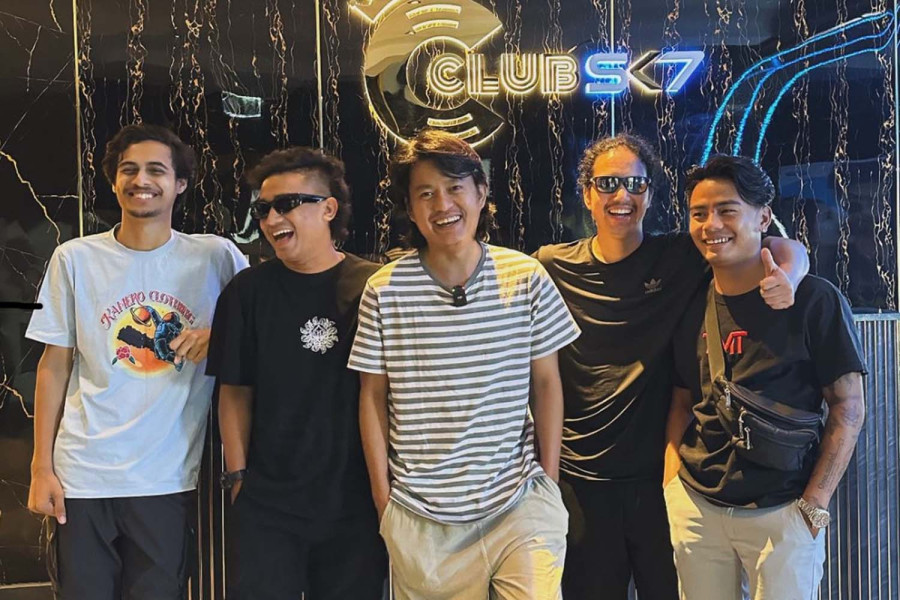Culture & Lifestyle
The sound of simplicity
‘Purna Rai and Dajubhaiharu’ capture the essence of life through their melodies and lyrics.
Rishika Dhakal
'Sparsha Sangeet' by Purna Rai and Dajubhaiharu recently went viral on TikTok, with numerous users creating videos featuring the song. However, as the band's manager, Shristy Shrestha, says, their earlier song, 'Kalo Seto', first brought them attention, quickly reaching one million views. Shrestha notes, "That track made people recognise the band."
The band, Purna Rai and Dajubaiharu, originated in Dharan when five musicians came together to form the group.
The band consists of Purna Rai, the lead vocalist; Degosh Rai, on bass; Susan Karki, on guitar; Sumek Yonjan, on drums; and Eyan Thulung Rai, who plays the flute. Speaking about his band, Purna Rai shares, "What I appreciate most about my bandmates is their extensive experience with instruments,”
Three of the five members hail from Dharan. Guitarist Sushant Karki, originally from Urlabari, now resides there. Karki reflected on his musical journey, "I was inspired to learn guitar by my father and uncle, who used to play instruments."
Sushant Karki, who has been playing guitar for the past 15 years, previously performed with bands like Sankapla and Rocking Filili and has collaborated with artists Trishna Gurung and Ankita Pun.
Similarly, bassist Digosh Kumar Rai has played the bass for 16 years. Raised in Dharan, he was a Free Birds Nepal band member and played alongside Karki in Rocking Filili and with Ankita Pun. Kumar Rai shares, "I competed in the reality TV show Band Champion Nepal, where I finished as first runners-up."
Eyan Thulung Rai, the band's flautist, has also played for over 15 years. Regular visits to the Pashupatinath temple sparked his passion for the flute. "In grade 6, I heard someone playing the flute at a classical music festival," he recalls. "The sound felt magical, and I decided to learn." Drummer Sumek Yonjan was influenced by his brothers, who frequently listened to rock music and Nepali songs. His drumming journey began in 2013, performing in pubs.
Lead vocalist Rai, on the other hand, never intended to become a singer. "My brothers used to sing and write music, but I never saw myself as a singer," he says.
His brother's passion for music eventually led Rai down the same path, with his musical growth further nurtured during his school years in Darjeeling. "I had no friends in school, so I wrote songs. Before I knew it, I had written quite a few, and that’s when I decided to record at least one," Rai shares.
After recording two songs in his college studio, Rai found the experience addictive. “I formed my first band with batchmates from Darjeeling. However, after returning to Dharan, it became difficult to stay in touch with the band members, and over time, their interest faded,” he recalls.
Following this, Rai decided to create music on his own. “I wanted to collaborate with different musicians and explore various styles. I didn’t want to be confined to one genre; I wanted to work with diverse artists,” Rai explains.
He continued making music and recorded a song called ‘Mana Ka Kura.’ After its success, Rai realised he needed to keep singing and creating music. Therefore, on December 2, 2023, Purna Rai and Daju Bhaiharu was formed. “Our first project as a band was 'Paribhasa’," says Rai.
Rai explains the origin of the band's name, "Initially, my band members were Steve and Mannu, the sons of my mother’s sister, who are now part of John Rai and the Locals. They were the 'Daju' (older brother) and 'Bhai' (younger brother), and since I was Purna Rai, we came up with the name ‘Purna Rai and Daju Bhai Haru.’"
Rai added, "After a mutual understanding, we parted ways, and I went on to form my band." The group has performed at 50 shows, including international performances in Australia, Dubai, and Siliguri.

When discussing the inspiration behind some of their popular tracks, the band members revealed that ‘Mana Ka Kura’ is about the struggle of expressing feelings to a crush; as for ‘Sparsha Sangeet,’ Rai shares that he hadn’t initially intended it to show the relationship between a mother and son. "It was only later that I realised how beautifully the song captures that bond," he explained.
“My initial plan with ‘Kalo Seto’ was to make it comical by including humour. I’ve written funny songs and considered creating a whole album of such songs. 'Nabheteko Bhaye' was written later and is related to my experience,” says Rai.
When asked if any particular song held special significance for the band, the members highlighted ‘Biram.’ “I wrote ‘Biram’ after my first breakup, and even now, it brings me to tears," Rai shared. As the band's lyricist, Rai emphasised his desire to keep his music simple and authentic. “My lyrics stem from my experiences and lessons in life, so I aim for the emotions I convey through my songs to be pure, simple, and raw.”
When asked how they would describe their songs to someone who has never heard them, Yonjan replied, “Heart-touching.” He added, “We don’t stick to a particular genre; we sing what we feel. Our music varies over time, so we don’t focus on adhering to one style.” Degosh Rai chimed in, “Everyone has different musical tastes. Because of this variety, our inspirations come from various sources and aren’t limited to a specific genre.”
Reflecting on the band's challenges, Shrestha, the band’s manager, says, “In the beginning, we struggled to build an audience and encountered financial issues. Finding the suitable instruments to play was also challenging.
The bassist, Rai, says, "Forming the band was one thing, but building a cohesive team was a significant challenge." Each member has their ambitions for the band. Karki aims to create more music, while Rai says, “For me, the band's growth is the goal.” Yonjan prefers to go with the flow.
Shrestha shares, “Art is about creativity, not setting specific goals. We are creators and will continue to create. Our main goal is to sustain Purna Rai and Daju Bhaiharu in Nepal’s musical landscape.” The band plans to release their new song next month.




 15.47°C Kathmandu
15.47°C Kathmandu















